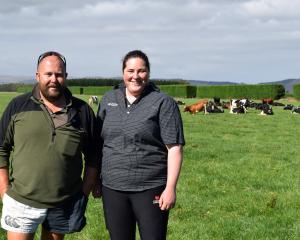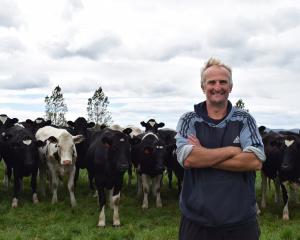
The dairy giant has put up a possible range of $7.25-$8.75 per kilogram of milks solids for 2024-25. Most banks have cast a scenario higher than this with forecasts varying from $8.20/kg to $8.50/kg.
ASB said in its commodities weekly report it would stick with its $8.35/kg forecast for next season as it was still early days, and Fonterra’s cautious approach was understandable.
The bank has adopted Fonterra’s midpoint of $7.80/kg for 2023-24.
For the season ahead other banks include Rabobank at $8.40/kg, BNZ at $8.20/kg, Westpac at $8.40/kg and ANZ at $8.50/kg.
BNZ senior economist Doug Steel said Fonterra’s forecast for 2024-25 was a wide and realistic, but possibly cautious, range.
"Indeed, our own 2024-25 milk price forecast, that has remained unchanged for months at $8.20/kg, could be seen as a bit conservative too given it also factors in lower GDT prices on average over the season ahead compared to current levels."
In Rabobank’s latest report, senior agriculture analyst Emma Higgins said the co-operative’s new season midpoint sat slightly below the bank’s national break-even milk price.
That would likely provide another season of fiscal constraint for dairy farmers, she said.
Dairy commodity markets had improved over the past month with butter prices hovering around 2022 records, while powder prices had lifted from the slump earlier this year.
Global demand settings remained soft and warranted a note of caution – particularly for milk fat prices.
Ms Higgins said the key weight on the global dairy market remained New Zealand’s main trading partner of China.
Softer import demand was expected for this year, marking the third consecutive year of weaker import volumes.
Rabobank’s forecast is for China’s net imports to be 8% lower compared with last year.
Chinese domestic milk production is being underlined as a critical factor for assessing movements in the farm-gate milk price forecast for the season ahead. However, global milk production continues to lose steam, expected to expand only modestly from the third quarter to the end of the year.
Fonterra’s current season forecast remains at a $7.80/kg midpoint based on a narrowed range of $7.70/kg-$7.90/kg.
Operation earnings have been re-set from 50 cents to 65c per share to 60c to 70c.
The co-op also announced in its business update for the third quarter a profit after tax from continuing operations of $1.013 billion, up $20 million or equivalent to 61c per share.
This was driven by continued strong earnings in ingredients, food service and consumer channels.
Operation earnings included income from the discontinued operations of DPA Brazil in this financial year and DPA Brazil, Soprole and China Farms over the last financial year.
Global Dairy Trade prices have lifted over the past couple of months, back to levels seen around the start of the calendar year.
Chief executive Miles Hurrell said the current season forecast range had been narrowed as it was nearing the end of the season.
He said the co-op had taken a conservative view for the 2024-25 forecast.
“Milk supply and demand dynamics remain finely balanced and China import volumes have not yet recovered to historic levels. Given the early point in the season, the uncertainty in the outlook and ongoing risk of volatility in global markets, we are starting the season with a cautious approach."
He said sales volumes were up slightly on last year from higher sales in food service and consumer channels. Ingredients were down following record highs.
He said operating expenses were up from inflation, the upfront costs of driving efficiency improvements and increased IT spending.
“We are heading into year end with a strong balance sheet, with Fonterra’s underlying performance and lower debt position helping to further reduce our financing costs."
Last month’s change in strategic direction had resulted in strong interest from parties looking to be involved in the potential divestment of consumer and associated businesses, he said.
“It’s still early days in this process, and we commit to providing farmer shareholders, unit holders, our people and the market updated on new developments as they occur."
Rabobank reports milk tonnages domestically are back 0.5% on the season to April.
Milk production for the 2024-25 season is likely to be moderately stronger, because of expected improved weather and weak comparable values. However, La Nina forecasts could cast a shadow on this prediction.
Downsides include the avian flu which is infecting cows in parts of the United States.
The opening forecast for Canterbury-based Synlait, is $8/kg for the 2024/2025 season.
The company needed shareholder approval to accept a $130million loan from Chinese shareholder, Bright Dairy, to repay debt.
Synlait announced to NZX it was unable to find a good offer for the sale of its consumer dairy products business Dairyworks.
A "significant majority" of its farmer supplier base has signalled through cessation to supply notices they want out unless it improves after a $96m first half loss.














